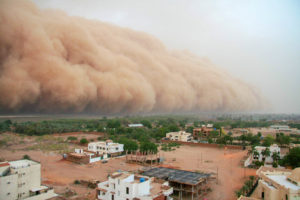 If you’ve got asthma or allergies and are trying to navigate through the COVID-19 epidemic, things might get a little more difficult in the coming days. A significant dust plume is traveling across the Atlantic Ocean and is estimated to reach the U.S. Gulf Coast soon.
If you’ve got asthma or allergies and are trying to navigate through the COVID-19 epidemic, things might get a little more difficult in the coming days. A significant dust plume is traveling across the Atlantic Ocean and is estimated to reach the U.S. Gulf Coast soon.
Although it happens a few times a year, this dust plume is especially large. It originated over the Sahara Desert in North Africa and has been heading west. As of this writing, it is over the Caribbean region.
Advertisement
The plume can make it hard to breathe for everybody, but those with respiratory conditions or allergies will have the most significant challenges.
Tiny dust particles in the plume will likely lead to eye, nose, and throat irritation plus difficulty breathing. Combined with air pollution, other allergens, and COVID-19, this can be a very concerning and stressful situation.
If you notice your allergies acting up or asthma symptoms flaring in the coming days, do not panic. It might make sense to stay indoors, if possible, to minimize the effects of the dust plume and exposure to COVID-19.
When staying indoors isn’t an option, there are few other things you can do to prepare yourself.
One of the first things to do is to follow the weather. Use resources that report air quality so you can determine if it is safe for you to go outside. When you do go out, wear a face mask (something you should be used to during the COVID-19 pandemic).
Advertisement
Continue along with your current symptom management techniques and do your best to stay calm. Panic and stress can increase asthma symptoms, making them more severe and much harder to manage.
Trying to limit inflammation might help manage symptoms. You should also reduce your intake of inflammatory foods and include more anti-inflammatory foods. Avoiding items that cause an allergic reaction is essential, but fruit, vegetables, whole grains, and healthy fats are recommended.
Avoiding allergies and asthma symptoms can be difficult and stressful under normal conditions. A dust plume and epidemic attacking the respiratory system doesn’t make it any easier. Do your best to limit exposure to these conditions and try to stay safe.
